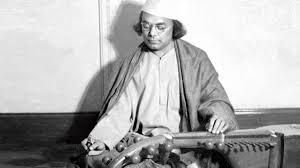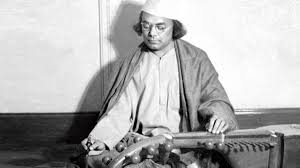(At the end of the fast of Ramadan, the happy Eid came
You give yourself away today, listen to the heavenly urge.’)
‘’Oo mon romjaner oi rojar sheshe elo khushir Eid
Tui apnake aj biliye de , shon asmani tagid’’
This timeless song is an essential part of the Bengali Muslim Eid festival. This song started playing on television and radio as soon as the Eid moon was announced. Our Ramadan Eid remains incomplete without this song.

National Poet Kazi Nazrul Islam wrote it at the request of popular artist Abbasuddin Ahmed. On May 25, 1931, this song was recorded for the first time. The composer of the song was Kazi Nazrul Islam himself.
There is a story behind the composition of this song. Abbasuddin Ahmad was a famous musician. He was also a disciple of Nazrul.
One day Abbasuddin said to Nazrul, you have written many beautiful songs. But there are very few Islamic songs in Bengali language. If you write Islamic songs in Bengali, then your song of victory will be heard in the homes of Muslims.
Nazrul was very happy to hear Abbasuddin’s words. He said to Abbasuddin, I will keep your promise. I will write a song for Eid-ul-Fitr.
Abbasuddin was very happy to hear Nazrul’s words. He requested Nazrul to write the song.
Nazrul started writing the song. He highlighted the joy and happiness of Eid-ul-Fitr in the song. He also mentioned the history and traditions of Islam in the song.
Within a few days, Nazrul finished writing the song. He narrated the song to Abbasuddin. Abbasuddin was very impressed to hear the song. He got ready to record the song.
On May 25, 1931, this song was recorded for the first time. The song was recorded by His Masters Company. After the song was recorded, it became popular all over Bengal in no time. The song was widely circulated among Bengali Muslims.
After recording the song, Eid-ul-Fitr was two months away. It is true that this record will come to the market on Eid.
Abbasuddin went to his home in Cooch Behar during the Eid holidays. One day he returned to Calcutta and went to office by tram. A young man sitting next to him is humming and singing, ‘O man at the end of that fast of Ramadan’. Abbasuddin was a little surprised. How did he hear this song!
After the office break, Abbas went for a walk in the field. Among a group of boys in the field, a boy sang, ‘O man at the end of that fast of Ramadan’. Then Abbasuddin remembered that this song should be released during Eid!
Senola immediately went to Vibhutidar store of record company. Seeing Abbasuddin, Vibhutibabu hugged him. He brought sandesh, rasgolla, tea to eat. Putting two of Abbasuddin’s songs and a bundle of his big picture printed on art paper in front of him, he said, ‘Distribute it to your friends. I printed about seventy-eighty thousand, distributed these on the day of Eid. And look, I brought you two thousand records.’
Abbasuddin’s heart was filled with joy. He entered the rehearsal room of the Gramophone Company. Hearing his voice, Nazrul jumped up and hugged him to his chest. ‘Abbas, what is your song…’ he kissed Nazrul without saying anything. He said to Bhagwati Babu, ‘Then I survived the experiment, how? He said, ‘Now then, a few more songs like this…’ Abbasuddin thanked God for everything.




